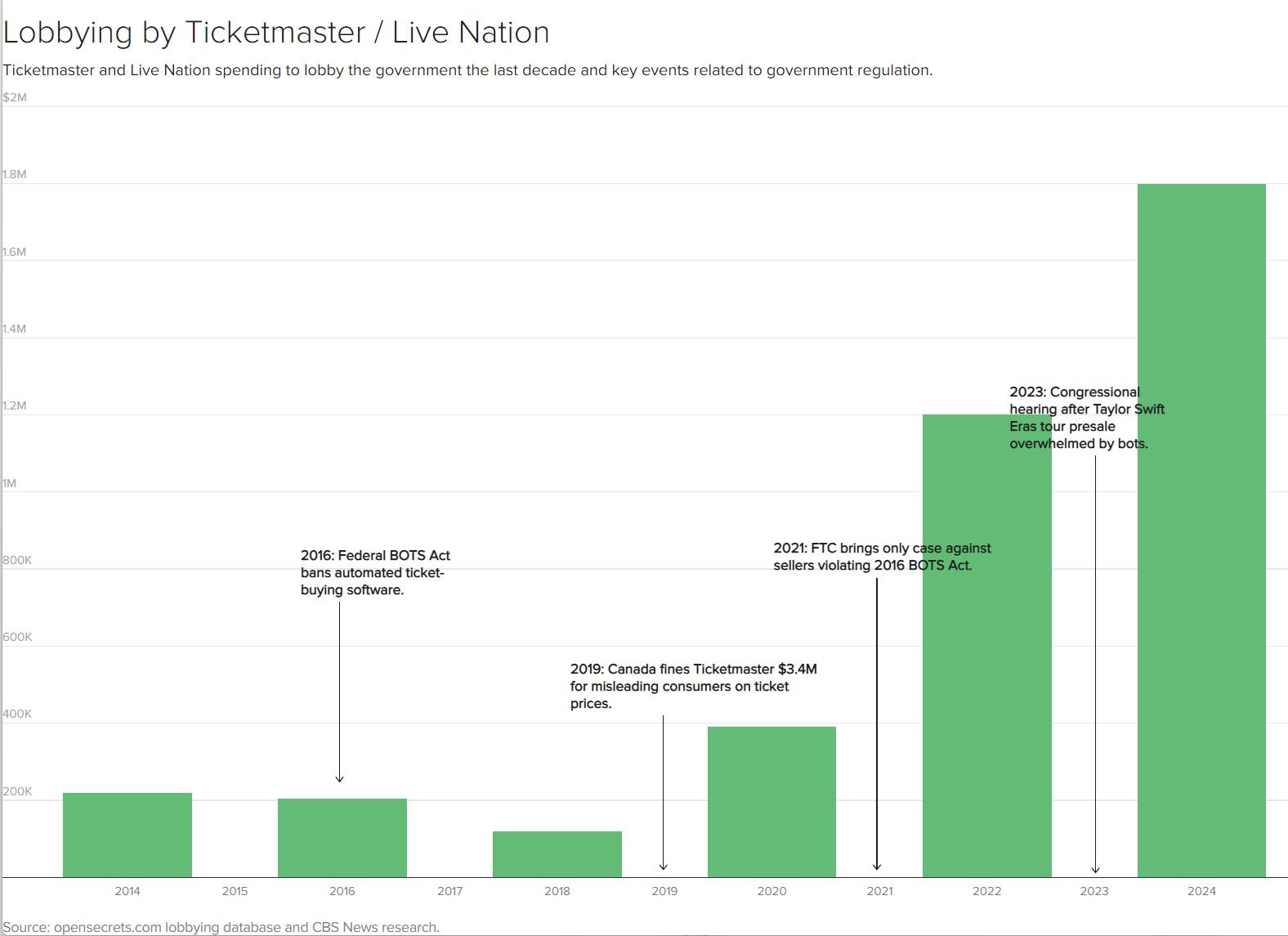CBS News
Frustrated Taylor Swift fans battle ticket bots and Ticketmaster

U.S. lawmakers are giving fans a spark of hope they could buy event tickets at more affordable prices. Several senators told CBS News they would support federal legislation that limits the profit sellers can make on the ticket resale market. The idea stems from growing calls for a crackdown on resale practices, which derailed the 2022 Taylor Swift Eras Tour ticket rollout.
People can make thousands of dollars in profit by selling tickets at inflated prices on the secondary market to consumers who missed out on the original sale. Prices are driven even higher by resellers who use automated software called bots to bulk-buy mass quantities of tickets at once.
Complaints about these systems came to a head during the November 2022 presale to Taylor Swift’s Eras tour.
The botched Eras Tour sale
Ticketmaster, the platform responsible for selling most of the Swift tour tickets, blamed the massive bot attack for crashing its website when the Eras Tour ticket presale launched on Nov. 15, 2022. The site received 3.5 billion requests that day, which caused the company to temporarily suspend sales and made it harder for fans to acquire face-value tickets.
Countless fans who had registered to receive presale codes struggled to buy tickets. Almost immediately, Swift tickets popped up on the secondary market, including on Ticketmaster’s own online resale platform. Some Taylor Swift fans paid as much as 70 times the original selling price for seats; many were unable to get tickets at all.
Hector Vivas/TAS23/Getty Images for TAS Rights Management
At a Senate Judiciary hearing in January 2023, the president and chief financial officer of Ticketmaster parent company Live Nation Entertainment, Joe Berchtold, accepted responsibility for the botched sale but blamed high traffic and cyber-attacks for the failure.
Outlawed bots, little enforcement
The Better Online Ticket Sales Act, known as the BOTS Act, passed in 2016, made it illegal for ticket buyers to use bots to circumvent online ticket restrictions, or to sell tickets purchased using bots on the secondary market. It also gave the Federal Trade Commission authority to enforce the law. The FTC, however, has only used the BOTS Act to take law enforcement action once, against three New York ticket brokers, in January 2021. The agency said the defendants will pay $3.7 million in civil penalties.
While the FTC said it “remains committed to enforcing the BOTS Act,” the agency confirmed it has not announced any additional BOTS Act cases since.
FTC data obtained by CBS News shows the agency has received 105 complaints about BOTS Act violations since 2017; the majority were received last year.
“The FTC has let the bots run wild,” Sen. Marsha Blackburn of Tennessee said in a 2022 op-ed. “Their inaction opens the door for scalpers to make secondary markets the only option for normal consumers.”
Lawmakers are now circulating about a half dozen pieces of new legislation that would strengthen the BOTS Act. Blackburn and Sen. Ben Ray Lujan of New Mexico are sponsoring the Mitigating Automated Internet Networks for (MAIN) Event Ticketing Act. Senators John Cornyn of Texas and Amy Klobuchar of Minnesota are sponsoring the Fans First Act.
UCLA Nimoy Theater
A cap on resale
To discourage the use of ticket bots and protect consumers from having to pay exorbitant prices for live events, lawmakers in the Australian states of New South Wales, West Australia and Victoria limited the profit incentive by passing laws that make it illegal to resell tickets for more than 10% above face value.
“[The laws] mean that scalpers and platforms that enable scalping can be held to account,” said a spokesperson for NSW Fair “[The laws] mean that scalpers and platforms that enable scalping can be held to account,” said a spokesperson for Fair Trading, the government agency that administers consumer protection laws in New South Wales.
Violators face a maximum fine of $110,000 for a corporation or $22,000 for an individual.
NSW Fair Trading said it conducted 14 investigations in 2023 following complaints from consumers about ticket reselling. Since the law was passed in 2018, the agency said it has issued more than $40,000 in fines.
Klobuchar’s Fans First Act does not include a cap on ticket resale profits, but she told CBS News she’d consider new legislation that would include it.
“I’m very open to that idea,” Klobuchar said. “I just had to get what I could in an agreement right now, and that is just basic consumer rights.”
Lujan told CBS News he would support the cap, as well.
“I’m open to many of these ideas we’ve seen work in other parts of the world, he said.
CBS News asked Ticketmaster if the company would support federal legislation that would put a profit cap on ticket resale in the U.S.
“We operate in many countries that have similar laws, and we are all for universal industry solutions,” said Kaitlyn Henrich, spokesperson for Ticketmaster Corporate Affairs “If Congress could pass a law that, put that across the entire industry, we’d all be on a level playing field. Short of a universal law like that, we think the next best thing is letting artists decide the terms for their tour.”
“We think giving [artists] more control over how their tickets could be resold could help solve the overall problem,” Henrich said.
The Coalition for Ticket Fairness, which lobbies on behalf of ticket resellers, opposes new limits on ticket resales.
“While that sounds good in theory, the reality is resellers act as a check on the power of Ticketmaster and other primary sellers, by providing options,” said CTF Executive Director Dana McLean in an email. “When there are 20,000 seats and 300,000 people who want them, legislation can only do so much. The best policies encourage competition and transparent pricing.” (Full statement here)
Fans take action
Jennifer Kinder, a single mother and personal injury attorney from Dallas, Texas, represents more than 350 fellow Taylor Swift fans in separate lawsuits which accuse Ticketmaster and Live Nation of fraud, price-fixing and failing to protect fans from bots.
Kinder recently set up meetings between her clients and numerous congressional staff members and lawmakers, hoping to build momentum for the stalled proposed legislation.
“If we, arm in arm, can’t effectuate change, then who can?” Kinder asked. “Who’s left to do it if Swifties can’t?”
Lead plaintiff Julie Barfuss traveled to the Capitol from her home in Utah.
“I think we’d like to come back again and hopefully just keep advocating for these bills and for change as it goes forward,” said Barfuss. “That’s our next step on two fronts — obviously still the lawsuit, but we will also be back here in D.C.”
Kinder client Jennifer Wilkins of Oakland, California, said it’s not about getting a payout — it’s about changing a system she believes encourages ticket resales. Wilkins pointed out that’s partly because Ticketmaster operates its own platform on the secondary market, which is called “Ticketmaster Verified.”
“I feel like we got cheated,” said Wilkinson. “Ticketmaster can profit twice from these tickets. When bots or when people released tickets secondhand, Ticketmaster gets a fee — a portion of the sale price of the ticket, in addition to the fee that they collected the first time they sold the ticket. So, I’m thinking they don’t really have much incentive to change this system that they have.”
John Kelly, CBS News
Behind the scenes with a former botter
Bots aren’t only used to buy event tickets.
“The idea is you’re looking for any product, whether it’s sneakers, whether it’s consoles — anything that can go up in price because so many people want it,” said Mitch Davis, a former “sneaker botter” from Australia.
Davis spent years programming bots to attack e-commerce sites to buy up mass numbers of limited-edition athletic shoes.
“We were taking thousands of these pairs at every release,” he said. “After that, we resold them. So, you’re basically buying these shoes for $100, $200 and selling them for five, six times the price.”
According to the online fraud protection firm DataDome, between 2015 and 2016, one botter was able to snatch up 30,000 tickets to the Broadway show “Hamilton” and more than a thousand tickets to a U2 concert. Each bot attack lasted less than 60 seconds. In another case, a malicious bot bought 520 Beyoncé concert tickets in just three minutes.
Davis says the Eras Tour attack presented what botters considered a perfect opportunity, where low supply met unprecedented demand.
“[When I heard what happened] I thought someone just made a lot of money,” Davis said. “Someone’s bot worked exactly how they wanted to.”
John Kelly, CBS News
Ticketmaster responds
“We are dealing with bots in the billions every single day and it’s just exponential growth,” Ticketmaster’s Henrich said.
She said the company invests heavily to fight off bott attacks which are fueled, in part, by the low initial ticket prices set by artists.
“The reality is we work on behalf of venues, teams, artists,” she said. “They’re setting the terms of their ticket on sales. Artists could charge the tippy top price for their tickets tomorrow, and the resale scalper problem would disappear overnight.”
Henrich believes most artists don’t want to do that.
“They’re trying to foster a long career,” she said. “They want a broad fan base, and to do that, they want to keep their tickets as accessible as possible.”
CBS News emailed representatives of several artists including Taylor Swift, Bad Bunny, Doja Cat and Pearl Jam to ask about the resale issue and got no response.
Ticketmaster substantially ramped up their spending on federal lobbying during the last two Congresses. See the change in the chart below; here’s a link to explore a larger version of the chart
Open Secrets/CBS News
Cybersecurity solutions
Most bot use is legal and can make life easier for companies and consumers. Chat bots, for example, help with customer service requests when a live agent isn’t available; other bots scan websites for copyright violations.
While former botter Mitch Davis didn’t break any laws when he used the automated software to buy up limited edition sneakers for resale, he said he’s now trying to be part of the solution. He helps companies fight bad bots as a data scientist with Bay Area cybersecurity startup Arkose Labs.
“Having all the knowledge that I have garnered over the years, we can create these different fingerprints or behavioral metrics,” said Davis. “Understanding how humans browse through a website, how they check out, it’s very distinct how a human does things on a computer.”
Along with Davis’ expertise, Arkose uses artificial intelligence and other tools to identify and neutralize automated bots that try to attack websites for clients including Microsoft, OpenAI, Roblox and Expedia.
“If we think it’s automated, we challenge it,” said Arkose Labs CEO and founder Kevin Gosschalk. “And that challenge is a way of forcing the bad actors to have to do an action of some kind.”
One tactic is to require website visitors to solve more complex CAPTCHA puzzles that require advanced reasoning to prove an action is being performed by a human and not a bot.
“Our strategy is to go after the ultimate goal of them making money,” Gosschalk said. “We want it to be more expensive than their profit margin. If we can do that, then they’re out of business.”
CBS News
Behind Trump’s response to Hegseth sexual assault allegations

Watch CBS News
Be the first to know
Get browser notifications for breaking news, live events, and exclusive reporting.
CBS News
Missing skydiver found dead several miles from intended landing spot in Louisiana

A skydiver was found dead in northwestern Louisiana over the weekend after his parachute failed to deploy, authorities said. He was briefly reported missing in the wake of the jump.
The Caddo Parish Sheriff’s Office identified the skydiver as an Asian male but did not share his name. On Saturday afternoon, the office said a search was underway for a skydiver last seen in the Gilliam area, which is about 25 miles north of Shreveport. The sheriff had received a report just before 1:30 p.m. local time from Gilliam Airport that notified them he was missing.
Deputies learned the skydiver’s parachute did not deploy when they arrived at the airfield, according to the sheriff. Multiple agencies began to search for the man, including an air rescue team and units from the North Caddo Medical Center, Caddo Fire District and the Wildlife and Fisheries Department, along with the Caddo Sheriff’s Office.
The missing skydiver was found dead about two hours later, the sheriff said, noting that searchers discovered his body a couple of miles from his intended landing spot. Authorities are investigating the incident.
Skydiving accidents are rare. The United States Parachute Association reported 10 fatalities during skydives in 2023, out of 3.65 million jumps recorded throughout the year. While experts recognize the sport can be dangerous, the USPA has said most accidents occur as a result of human error, not equipment failure.
“Many of the accidents occur because the jumper—oftentimes an experienced skydiver who is pushing the limits— makes an error in judgment while landing a perfectly functioning parachute,” the USPA writes on its website, likening skydiving incidents to automobile accidents that “are not usually the result of equipment failure, but rather operator mistakes.”
CBS News
3 important facts to know if your credit card debt goes to collections

Assoonas/Getty Images
Falling behind on credit card payments can be a tough issue to deal with, but it becomes even more challenging when your debt is sent to collections. When that happens, the friendly reminders from your card issuer are replaced with persistent calls and letters from third-party collectors. This can be a stressful experience, but it’s important to remember that there are ways to regain control of the situation. Educating yourself about the process and your rights can help empower you to make informed decisions.
Credit card debt is considered “in collections” when your original creditor has either sold the debt to a collections agency or hired one to recover the unpaid balance. This usually happens after 90 to 180 days of missed payments. By this point, the creditor has decided that recovering the debt internally isn’t feasible and has turned it over to a third party to minimize their losses. While this escalation may feel like the end of the process, it’s actually a pivotal moment when you can take steps to address the problem.
If your credit card debt goes to collections, it’s critical to approach the situation with clarity and strategy. Knowing what to expect, understanding your rights and exploring your options can make a significant difference.
Learn how to get rid of your high-rate credit card debt today.
What to know if your credit card debt goes to collections
Below are three crucial things you need to know if your credit card debt goes to collections.
Ignoring the debt can have serious consequences
One of the worst things you can do when your credit card debt goes to collections is to ignore it. While it’s natural to want to avoid the stress, inaction can lead to significant consequences. If the collection agency cannot reach an agreement with you, they may sue you for the unpaid debt. If they win the lawsuit, they could obtain a judgment against you, which might lead to wage garnishment, bank account levies or liens on your property.
Ignoring the debt can also hurt your credit score. A collections account on your credit report can remain for up to seven years from the date of the first missed payment, significantly impacting your ability to obtain credit in the future. While paying off the debt won’t remove the account from your report, it will show it as “paid,” which is viewed more favorably by lenders. Taking steps to address the debt, even if it’s just a small payment plan, can help mitigate the long-term damage to your financial health.
Find out how working with a debt relief company could benefit you now.
You have legal rights
The Fair Debt Collection Practices Act (FDCPA) is a federal law designed to protect consumers from abusive, unfair or deceptive practices by debt collectors. Understanding your rights under this law is essential when dealing with collection agencies. For example, debt collectors are prohibited from calling you before 8 a.m. or after 9 p.m., using threatening language or contacting you at work if you’ve told them not to. Additionally, they are required to provide written validation of the debt within five days of contacting you.
If a debt collector violates your rights, you have the power to report them to the Consumer Financial Protection Bureau (CFPB) or your state’s attorney general’s office. Familiarizing yourself with these protections can prevent collectors from taking advantage of you and ensure that you’re treated fairly throughout the process. It’s also a good idea to document all communications with the debt collector, including the date, time and content of each interaction, as this can be useful if you need to dispute their actions.
You can negotiate with collectors
When your debt goes to collections, it doesn’t mean you’ve lost all control. In fact, collection agencies often buy debt for a fraction of its original value, which means they may be willing to accept less than the full amount owed. This opens the door for negotiation. Depending on your financial situation, you might be able to settle the debt for a lump sum payment that is less than the total amount owed or negotiate a payment plan that works for your budget.
Negotiating with your creditors can be done on your own or with the help of a debt relief company that specializes in working with creditors to reduce your balance. Many people opt for the latter, as working with a debt relief company means getting access to experts who are experienced in these types of negotiations, which is a large part of why, on average, working with a debt relief agency can result in paying 30% to 50% less than your initial balance.
Before engaging in negotiations, though, it’s important to assess your finances and determine what you can realistically afford to pay. You should also be sure to get any agreement in writing before making a payment, as this ensures the collector honors the terms.
The bottom line
Dealing with credit card debt in collections can be a daunting experience, but knowledge is your best ally. By understanding your rights, being proactive about negotiations and avoiding the temptation to ignore the situation, you can take control and work toward resolving the debt. While it may take time and effort, each step you take brings you closer to financial stability. Remember, this may be a challenging chapter, but it doesn’t define your financial future. With determination and the right approach, you can navigate this situation and rebuild your financial foundation.














